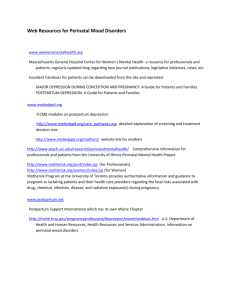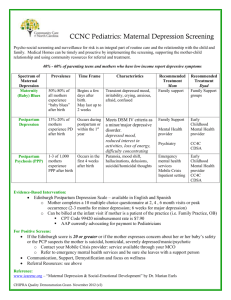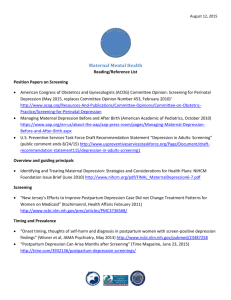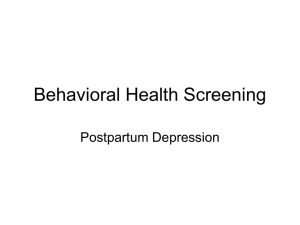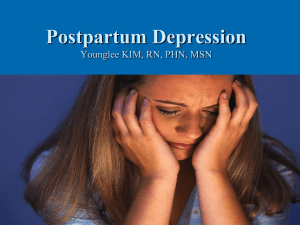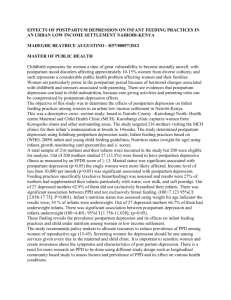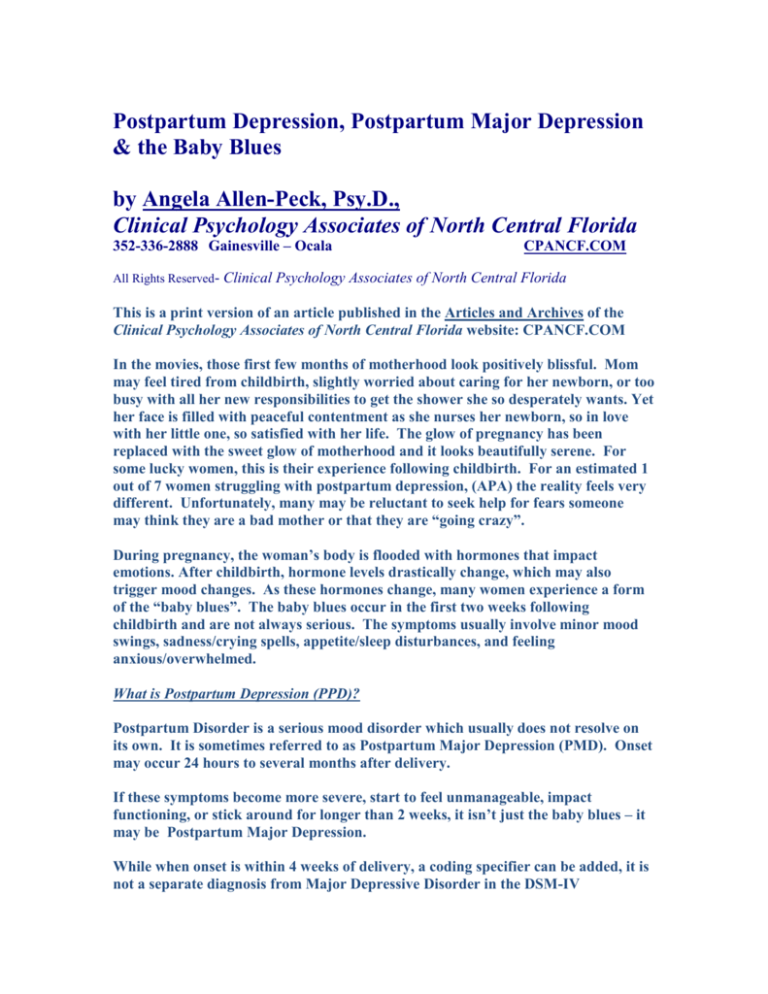
Postpartum Depression, Postpartum Major Depression
& the Baby Blues
by Angela Allen-Peck, Psy.D.,
Clinical Psychology Associates of North Central Florida
352-336-2888 Gainesville – Ocala
All Rights Reserved- Clinical
CPANCF.COM
Psychology Associates of North Central Florida
This is a print version of an article published in the Articles and Archives of the
Clinical Psychology Associates of North Central Florida website: CPANCF.COM
In the movies, those first few months of motherhood look positively blissful. Mom
may feel tired from childbirth, slightly worried about caring for her newborn, or too
busy with all her new responsibilities to get the shower she so desperately wants. Yet
her face is filled with peaceful contentment as she nurses her newborn, so in love
with her little one, so satisfied with her life. The glow of pregnancy has been
replaced with the sweet glow of motherhood and it looks beautifully serene. For
some lucky women, this is their experience following childbirth. For an estimated 1
out of 7 women struggling with postpartum depression, (APA) the reality feels very
different. Unfortunately, many may be reluctant to seek help for fears someone
may think they are a bad mother or that they are “going crazy”.
During pregnancy, the woman’s body is flooded with hormones that impact
emotions. After childbirth, hormone levels drastically change, which may also
trigger mood changes. As these hormones change, many women experience a form
of the “baby blues”. The baby blues occur in the first two weeks following
childbirth and are not always serious. The symptoms usually involve minor mood
swings, sadness/crying spells, appetite/sleep disturbances, and feeling
anxious/overwhelmed.
What is Postpartum Depression (PPD)?
Postpartum Disorder is a serious mood disorder which usually does not resolve on
its own. It is sometimes referred to as Postpartum Major Depression (PMD). Onset
may occur 24 hours to several months after delivery.
If these symptoms become more severe, start to feel unmanageable, impact
functioning, or stick around for longer than 2 weeks, it isn’t just the baby blues – it
may be Postpartum Major Depression.
While when onset is within 4 weeks of delivery, a coding specifier can be added, it is
not a separate diagnosis from Major Depressive Disorder in the DSM-IV
classification system of mental and nervous disorders. Left untreated it can last
several months to more than a year and can interfere with functioning.
While very rare, postpartum psychosis, involves psychotic symptoms like delusions
or hallucinations. This is a different disorder from postpartum depression.
What are the signs you might have Postpartum depression?
While previous depression and/or anxiety are common risk factors for Postpartum
Depression, half of the women who have PPD have never had depression before!
Postpartum Depression can involve some or all of the following symptoms:
-
You don’t take pleasure in relationships, activities, or things you used to
enjoy
You feel sad or cry even though you may not know why
It feels difficult to bond with your baby
You have excessive anxiety or worry, often about your abilities to take care
of the baby
Feeling very guilt or worthless
It seems that you are more irritable or agitated than usual; you may find
yourself getting angry over things that never used to bother you
You may feel afraid to be left alone with your baby
It’s hard to concentrate, focus, or make decisions
Your sleep and appetite levels are much higher or lower than normal
You’ve had thoughts about hurting yourself or your baby
The Edinburgh Postnatal Depression Scale has been used as a screening instrument.
We have provided links to the scale below. Individuals with scores above 12 or 13
should promptly consult their physician, psychiatrist or psychologist about the
possibility of postpartum depression.
What are some causes/risk factors for Postpartum depression?
-
Hormone changes during and after pregnancy
Social isolation (especially during maternity leave)
Previous history or family history of anxiety or depression
Having a child who is difficult to soothe, has special needs, or a premature
birth
Other stressors: difficulty breast feeding, financial issues, deaths in the
family, illness, etc.
Postpartum depression does NOT mean you are a bad mom or ungrateful for your
child. Postpartum depression is NOT the same as being a little tired or moody from
childbirth. It is a serious condition that impacts women regardless of income, age,
race, ethnicity or education level. Celebrities who have come forth as having been
diagnosed with Postpartum depression include: Gwyneth Paltrow, Brooke Shields,
Courtney Cox, Bryce Dallas-Howard and Lisa Rinna.
What does getting help look like?
Many women may avoid getting help because they fear others might judge their
mothering abilities or be critical because they aren’t happy during a time that is
supposed to be happy. Some moms put off getting help because they are hoping it
will just go away. Remember:
-
-
You can feel better. There are mental health professionals trained to treat
Postpartum depression and want to support women who struggle with this.
Counseling and/or medication can help.
You aren’t alone in this. Many women have struggled with this.
If you have any concerns about Postpartum depression, call and talk to a
professional (psychologist, family doctor, etc.). Don’t be afraid to ask a
friend or family member for help, too.
You are setting a powerful example for your child by taking care of yourself
and addressing Postpartum depression.
If you are feeling like you might harm yourself or your baby, put your baby in a
safe place (like a crib) and call 911 or one of the following numbers for immediate
help (7 days a week, 24 hrs a day).
National Hopeline Network
1-800-SUICIDE
1-800-784-2433
National Lifeline for Suicide Prevention
1-800-273-TALK
1-800-273-8255
If you live in the North Central Florida area, and it is not an immediate emergency
involving danger to yourself or your baby, feel free to call our office for an intake
appointment (352) 336-2888.
References and Support:
Click on Postpartum Support International for their website which has articles
about pregnancy and postpartum mood disorders, a list of free support groups, as
well as “Warmline” a phone support service offering information and resources in
English and Spanish.
Information about Postpartum Depression from the American Psychological
Association.
Information on Postpartum Depression and what you can do to help yourself from
the American Academy of Family Physicians.
Epperson, C.N. Postpartum Depression: Detection and Treatment. Published in
American Family Physician, 1999.
Edinburgh PostNatal Depression Scale (English)
Edinburgh PostNatal Depression Scale (Spanish)
Amazon.com Links to Related Books and Resources.
Disclaimer: The author of this article, Clinical Psychology Associates of North Central Florida
(CPANCF) and the owner of CPANCF do not endorse or make any warranties or representations
regarding the content or quality of any information on linked books or resources. Disclosure: We
earn a portion of Amazon.Com sales through links on this site. This goes to support this and our
other websites. Thank you.

